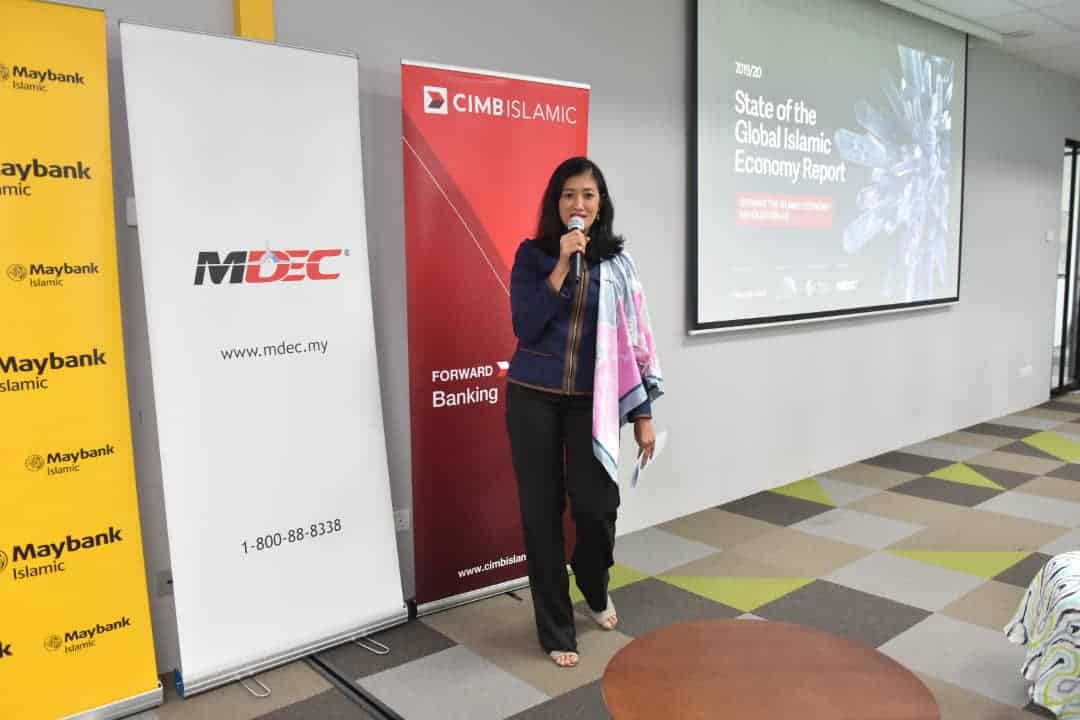Internationalisation ‘our agenda from here on’ as global Islamic economy expands - Malaysia’s digital agency chief
KUALA LUMPUR - Malaysian tech companies should look beyond Malaysia as the global Islamic economy expands, said Surina Shukri, CEO of MDEC, the government agency charged with promoting the country’s digital economy.
Surina was speaking at the launch of the State of the Global Islamic Economy 2019/20 report in Kuala Lumpur on Wednesday (Nov 13), that said Muslims spent 5.2% more in 2018 to $2.2 trillion across the food, pharmaceutical and lifestyle sectors.
The annual report, produced by Salaam Gateway’s parent, DinarStandard, forecasts Muslim consumption to reach $3.2 trillion by 2024.
“33% of the Islamic diaspora now doesn’t live in Islamic countries. The whole world is waking up in terms of the Islamic digital economy’s potential,” Surina told Salaam Gateway.
“This lends itself to e-commerce, not just in Malaysia but internationally. Our agenda from here on is going to be internationalisation of all our companies, not just our digital start-ups but our SMEs as well,” said the CEO.
“Malaysia has a huge export agenda, it’s a huge opportunity.”
INVESTMENTS
According to the report, investments have been playing an important role in driving growth across the Islamic economy. It tracked $1.2 billion invested globally in Islamic economy companies for the 12 months to end-July, reflecting an increase of 399% compared to 2017.
This figure reflects a broad span of corporate-led acquisitions, venture investments in halal-tech start-ups and private equity investment. Halal products garnered the lion’s share of investments, accounting for 54% of deal value, followed by Islamic finance at 42% and 4% in Islamic lifestyle, mainly in modest fashion and Muslim-friendly tourism.
The report identified a handful of sectors, including Islamic fintech and umrah travel tech as being “hot sectors” for growth in 2020.
Baiza Bain, a Kuala Lumpur investor in halal start-ups and founder of Ficus Venture Capital, said this year’s figures stacked up well for the investment community as they will help inform investors on market sizes and growth levels.
“As VCs, we look at the addressable market. Reports like this are always useful because they go in depth and they actually show the addressable market for companies we have our eyes on in terms of investment,” Baiza told Salaam Gateway.
“For halal technology, you wouldn’t know what is the addressable market in normal circumstances when you meet a company, because they try to extrapolate a general number,” he said.
In addition to the halal and lifestyle sectors, the report said Islamic finance assets increased by 3.5% to $2.5 trillion in 2018. It forecasts assets to reach $3.5 trillion by 2024.
While this growth is “encouraging”, Dr Liza Mydin, head of corporate strategy at Maybank Islamic, said there are still areas where Shariah-compliant finance still needs to catch up.
“When one speaks about the halal economy, Islamic finance should be a given, but that’s not the case at the moment,” Dr Liza told Salaam Gateway.
“The fact is that a number of investments still lag: we aren’t putting out our investment offerings and capturing the market. That we only account for about 0.1% of overall investment globally shows what must be done in terms of providing Shariah investments to the market.”
Islamic fintech also needs a boost. While DinarStandard lists 93 start-ups globally, “recent growth is still solidly based more on traditional banking services and products,” it says, adding: “Islamic banks can unlock substantial growth and profitability through digitisation.”
“The fintech space is very much a closed community. There needs to be more cross-sector collaboration: fintech needs to talk to the halal economy and food segments,” said Dr Liza.
“At policy level and industry level we need to have more cross-sector engagement of fintech. Partnerships will need to be more central,” she added.
PHARMA
Muslim expenditure on pharmaceuticals continues to grow and is expected to increase from $92 billion last year to $134 billion in 2024, according to the report.
Muslim-majority countries are net importers of pharmaceuticals, with exports predominantly in the hands of non-Muslim countries led by Germany and France, says the report.
“Even the concept of halal pharmaceuticals is poorly understood in Organisation of Islamic Cooperation (OIC) countries, not having gained the same traction as other Islamic economy sectors, such as halal food and modest fashion,” it says.
Seri Azalina Mohd Ghazalli, halal and government relations manager at Duopharma Biotech, the first Malaysian pharmaceuticals company to have halal certification, acknowledged there are misconceptions among Muslim consumers.
“We always want to correct their understanding as to how halal is bringing a value proposition to the pharmaceutical industry,” Seri Azalina told Salaam Gateway.
“Regardless of whether our products are halal or not, we are still selling our products and we know that the halal component gives them a plus factor.”
Companies could “generate substantial growth” by pursuing halal gelatin, nutraceuticals and vaccines, according to DinarStandard.
“It’s a realisation of the state of the economy and where we should take up the opportunity further with new product categories. In Malaysia we are looking at how we expand further,” said Seri Azalina.
(Reporting by Richard Whitehead; Editing by Emmy Abdul Alim emmy.abdulalim@salaamgateway.com)
© SalaamGateway.com 2019 All Rights Reserved
